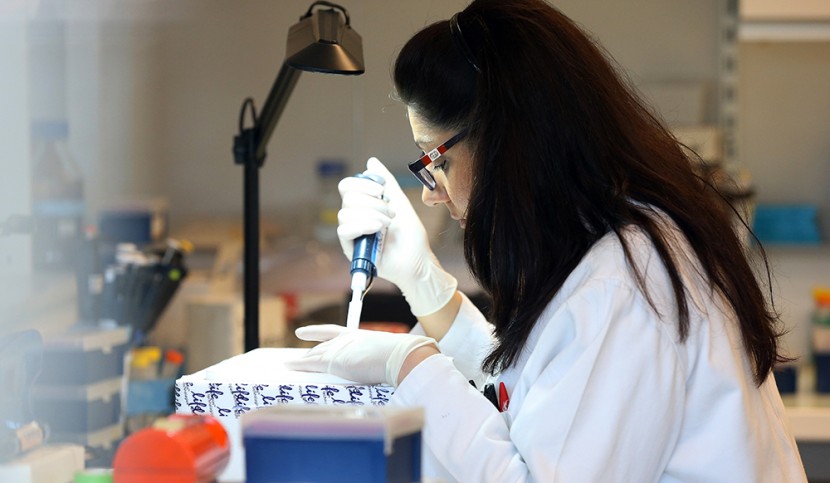A revolutionary approach
From a scientific point of view, the approach of the Institut du Cerveau – ICM is revolutionary since its research has no barriers. The research teams are thus independent, but allied in Transversal Research Programs that favour the mutualisation of competencies.
Basic research
Basic or pure research focuses on the foundations of a given discipline. It includes scientific research undertaken without an established economic purpose. Basic research is, however, essential because it helps us identify and understand how the body’s various systems function.
Clinical research
People are the central focus of this approach, still too rarely undertaken. Subjects with or without a health condition participate in research protocols to advance knowledge of a disease or therapy.
Translational research
This research provides a crucial link between basic and clinical research. The translational approach helps patients benefit more quickly from innovations in diagnosis and treatment. It constitutes the basis of the research undertaken at the Institut du Cerveau – ICM.
By bringing all three activities into the organization, driven by a shared purpose, we accelerate the discovery of new treatments.
Domains and thematics
5 Scientific Domains:
- Molecular and Cellular Neuroscience
- Integrated Neurophysiology
- Cognitive Neuroscience
- Clinical and Translational Neuroscience
- Computational modelling in Neuroscience
Transversal Scientific thematics:
- Neurogenetics
- Neuroimmunology
- Stem Cell and Repair
- Motor Neuron: from the cell body to the synapse
- Investigating subcellular organelles in NDG
- Propagation in brain proteinopathies
- Analysis of multimodal data
- Methodologies to treat rare neurological diseases
TRANSVERSAL RESEARCH THEMES
The Institut du Cerveau – ICM has chosen to organize its research around transversal and pluridisciplinary programs in order to meet the challenge of understanding nervous system diseases.
Our internal scientific strategy is axed on our capacity to promote excellent basic and applied science, but especially to favour the emergence of innovative concepts in the Institute. The Institut du Cerveau – ICM has thus chosen to organize research around transversal and pluridisciplinary programs in order to meet the challenge of understanding nervous system diseases. Such an organization implicates all Institut du Cerveau – ICM researchers in the scientific/technological options and reinforces collaboration among the participants.
The creation of thematic scientific groups encourages internal collaborations, permits the development of pluridisciplinary approaches, assures technological innovation in the core services and favours risk taking. An excellent research centre is above all an ensemble of projects sharing a common vision.
CALL FOR PROPOSAL : BIG BRAIN THEORY PROGRAM
The Institut du Cerveau – ICM and the IHU announced in June 2015 the launch of the Big Brain Theory Program. This new program will award seed grants to fund innovative, high-risk, “thinking out the box” and interdisciplinary research projects in Neuroscience for the researchers and clinicians of the Institute.
The Institute hope that each Big Brain Theory will aim at engaging PIs (Principal Investigators) and platforms in a collaborative effort to broaden the impact of his individual research and elaborate new pioneering project that will translate into collective breakthroughs and future emblem of the Institute.
MAJOR CROSS FUNCTIONAL PROJECTS
Paris Brain Institute is launching an ambitious initiative of major cross-functional and collaborative research programs.
These programs aim to make transformative contributions in their respective fields, and to foster synergistic collaborations within the institute and internationally. The teams at the Institut du Cerveau seek to build bridges between different disciplines, different approaches, and across a wide range of neurodegenerative pathologies. The aim of this profoundly interdisciplinary approach is to create new fields of exploration at the interfaces, enabling the emergence of new ideas and hypotheses at the frontiers of current knowledge, questioning current challenges in new ways. Some of these projects are conducted in conjunction with leading international research centers, representing a strategic move to broaden the global scope of our research.
The ultimate aim of these transversal programs is to open up concrete perspectives by accelerating translational and clinical research into new treatments and solutions for brain pathologies, with the idea of positively impacting the lives of nearly a billion patients worldwide by aiming to prevent, repair or alleviate the challenges posed by brain pathologies.
- NEUROPREMS major transverse project (project leaders: Alexandra Durr, Jean-Christophe Corvol) – Neurodegenerative and inflammatory markers in presymptomatic neurodegenerative diseases.
- Deep Brain Stimulation (DBS) major transverse project (project leader: Claire Wyart) – An approach to motor circuitry linking genes to behavior in Parkinson’s disease. More informations about DBS : click here.
To find out more about the DBS cross-functional project, click here. - NEIMO major transverse project (project leaders: Jean-Léon Thomas, Stéphanie Lenck) – Monitoring neuroinflammation, a collaborative initiative between the Brain Institute and Yale University (US).
- –Major Transversal Project HFGP@ICM (Project Leader: Bassem Hassan) – From genomic variation to clinical diagnosis: The Human Functional Genome Project







